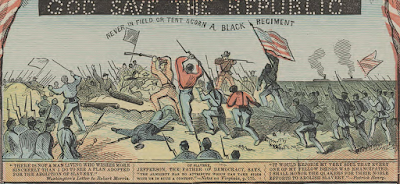I've said it before and I'll continue to say that I am amazed by the amount of fascinating primary sources on the Library of Congress website. Today, I found this image depicting various scenes from "Emancipation in Maryland."
Maryland, like the other slaveholding yet loyal border states of Kentucky, Missouri, and Delaware, found itself in a precarious position once the Emancipation Proclamation was proclaimed. Although exempt from the proclamation due to their situation, they apparently saw the end of slavery on the horizon, and passed state legislation abolishing slavery in November 1864. Missouri followed in January 1865. However, Kentucky and Delaware held out until the 13th Amendment was ratified in December 1865 to end human bondage.
The smaller images that make up the overall pictorial show the supporting relationship of persevering the Union and emancipation. Above, African American troops fight to "Save the Republic" against those who would see it dissolved.
As an upper-South slave state, Maryland like Virginia and Kentucky, supplied the Deep South cotton states with thousands of enslaved individuals in the decades before the Civil War. Now, with a new legislative enactment, that was over.
The images also include a couple of the heroic scenes of United States Colored Troops fighting in two of their most famous engagements. Above, Fort Wagner is referenced, which actually was fought on July 18, 1863, at Charleston Harbor. The 54th Massachusetts, which included a number of Maryland men, attained their "Glory" in this battle.













No comments:
Post a Comment